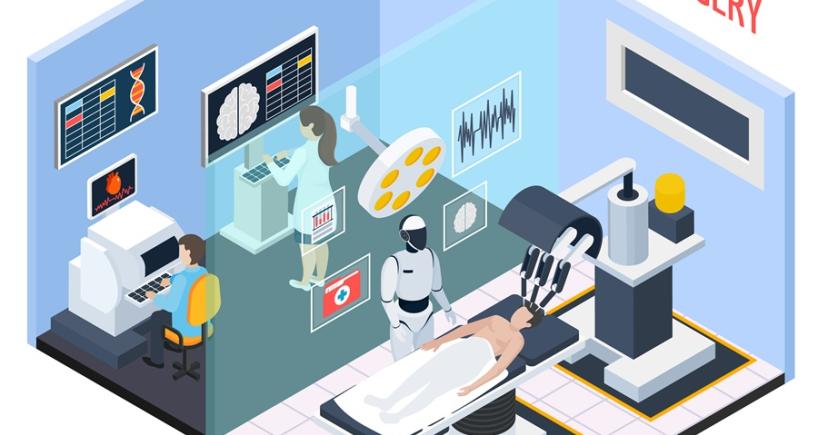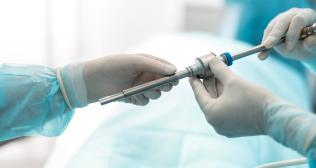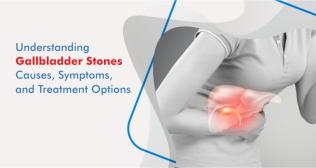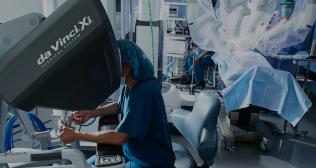
What are the Advantages of Next-Generation Robotic Surgery
Introduction
In the healthcare field that is changing rapidly, the coming of next-generation robotic surgery has transformed how operations are carried out offering an astonishing range of advantages to both patients and health care givers. Robotic surgery is becoming an increasingly common approach used in different medical specializations like general surgery, urology, organ transplantation and others where it employs modern technology to improve the surgical procedure followed by recovery stage for patients.
The evolution of robotic surgery has been gradual, with continuous advancements in technology and its applications, as evidenced by thousands of successful robot-assisted cases reported in the literature. The robotic systems are operated by skilled surgeons, allowing for
- Enhanced visualization
- Improved accuracy
- Ability to perform intricate procedures with unparalleled accuracy
Today Robot-assisted surgery (RAS) is the crucial element for minimally invasive procedures. It was invented to address the shortcomings of existing minimally invasive methods and to aid surgeons in enhancing the accuracy of traditional surgeries. With the aid of artificial intelligence and sophisticated diagnostic imaging from CT, PET, MRI, and nuclear scans surgeons can now utilize continually improving RAS systems for significantly improved surgical precision and accuracy.
Advantages of Next-Generation Robotic Surgery
The key advantages of next-generation robotic surgery are the enhanced precision and control it offers. The robotic instrument’s ability to translate the surgeon's movements with a high degree of accuracy, coupled with improved visualization through three-dimensional imaging, enables surgeons to navigate complex anatomical structures and perform delicate procedures.
Despite potential higher costs, the undeniable advantages in surgical outcomes and patient recovery make RAS a compelling choice. It's important to note that the surgeon's skill and experience also play a crucial role in the success of the surgery.
Expanding Opportunities for Minimally Invasive Surgeries
Another advantage of robot-assisted surgery (RAS) is its potential for minimally invasive procedures. Unlike traditional open surgery, RAS often requires smaller incisions. The robot is a guidance system that assists the surgeon in accurately making the bone cuts and placing the implants. This results in less trauma to the patient's body. The benefits of this are manifold - it can lead to less blood loss during the operation, a lower risk of post-operative infection, shorter stays in the hospital, and quicker recovery times. In essence, patients can get back to their normal lives more swiftly and with less discomfort.
Reducing Physical Strain on Surgeons
Another significant benefit of RAS is its ability to lessen the physical strain on surgeons. Performing long and complex procedures can be physically demanding, leading to fatigue that could potentially impact a surgeon's precision. However, robotic systems can perform the physically taxing aspects of the surgery, helping to alleviate this issue. This means surgeons can maintain their focus and precision throughout the procedure, regardless of its duration or complexity.
Enhancing Reach and Maneuverability
Finally, surgical robots offer greater reach and maneuverability compared to human hands. The robotic arms in these systems can rotate and bend far beyond the natural range of human hands. This enables surgeons to perform complex procedures in tight spaces and at challenging angles that would be difficult or impossible with traditional methods. As a result, surgeons can operate with fewer and smaller incisions.
Clinical Significance
With the development of the new generation of robotic surgery, better surgery characterized by improved precision, accuracy and patient results is being conducted. This kind of technology has come with 3-dimensional imaging techniques and flexible robotic arms that have greatly changed how we do operations.
Not only are there advantages realized within the theater but also outside its confines; for instance, most patients find themselves walking a few hours after they have had their procedures done and may go home on the same day or the next one. Patient’s postoperative experience becomes much better when they can start eating normal food from day one having been operated on using such advanced equipment as it promotes quick healing.
Furthermore, it should be noted that the next-generation surgical robotic surgery is designed to minimize blood loss. The use of very small port sizes not only reduces the risk of complications but also ensures excellent aesthetic results, enhancing patient satisfaction.
The future of surgery is in safe hands with the next-generation robotic surgical system. This system has advanced features and considers the needs of the patient. The use of surgical robots in operating theatres is a game changer and promising where surgeries are not only more precise and accurate but result in faster recovery and improved quality of life for patients.
Popular Searches :
Hospitals: Cancer Hospital in Delhi | Best Heart Hospital in Delhi | Hospital in Amritsar | Hospital in Ludhiana | Hospitals in Mohali | Hospital in Faridabad | Hospitals in Gurgaon | Best Hospital in Jaipur | Hospitals in Greater Noida | Hospitals in Noida | Best Kidney Hospital in Kolkata | Best Hospital in Kolkata | Hospitals in Rajajinagar Bangalore | Hospitals in Richmond Road Bangalore | Hospitals in Nagarbhavi Bangalore | Hospital in Kalyan West | Hospitals in Mulund | Best Hospital in India | | Cardiology Hospital in India | Best Cancer Hospital in India | Best Cardiology Hospital in India | Best Oncology Hospital In India | Best Cancer Hospital in Delhi | Best Liver Transplant Hospital in India
Doctors: Dr. Rana Patir | Dr. Rajesh Benny | Dr. Rahul Bhargava | Dr. Jayant Arora | Dr. Anoop Misra | Dr. Manu Tiwari | Dr. Praveer Agarwal | Dr. Arup Ratan Dutta | Dr. Meenakshi Ahuja | Dr. Anoop Jhurani | Dr. Shivaji Basu | Dr. Subhash Jangid | Dr. Atul Mathur | Dr. Gurinder Bedi | Dr. Monika Wadhawan | Dr. Debasis Datta | Dr. Shrinivas Narayan | Dr. Praveen Gupta | Dr. Nitin Jha | Dr. Raghu Nagaraj | Dr. Ashok Seth | Dr. Sandeep Vaishya | Dr. Atul Mishra | Dr. Z S Meharwal | Dr. Ajay Bhalla | Dr. Atul Kumar Mittal | Dr. Arvind Kumar Khurana | Dr. Narayan Hulse | Dr. Samir Parikh | Dr. Amit Javed | Dr. Narayan Banerjee | Dr. Bimlesh Dhar Pandey | Dr. Arghya Chattopadhyay | Dr. G.R. Vijay Kumar | Dr Ashok Gupta | Dr. Gourdas Choudhuri | Dr. Sushrut Singh | Dr. N.C. Krishnamani | Dr. Atampreet Singh | Dr. Vivek Jawali | Dr. Sanjeev Gulati | Dr. Amite Pankaj Aggarwal | Dr. Ajay Kaul | Dr. Sunita Varma | Dr. Manoj Kumar Goel | Dr. R Muralidharan | Dr. Sushmita Roychowdhury | Dr. T.S. MAHANT | Dr. UDIPTA RAY | Dr. Aparna Jaswal | Dr. Ravul Jindal | Dr. Savyasachi Saxena | Dr. Ajay Kumar Kriplani | Dr. Nitesh Rohatgi | Dr. Anupam Jindal |
Specialties: Heart Lung Transplant | Orthopedic | Cardiology Interventional | Obstetrics & Gynaecology | Onco Radiation | Neurosurgery | Interventional Cardiology | Gastroenterologist in Jaipur | Neuro Physician | Gynecologist in Kolkata | Best Neurologist in India | Liver Transfer |



















